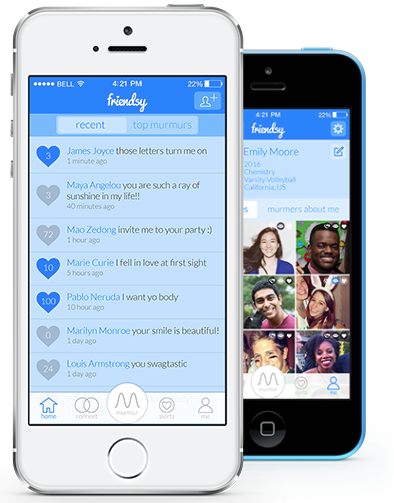By Joe Vitale
Social networks — with their abundance of members and absence of privacy — often result in users opting to share selectively.
Tinder profiles are kept from being “swiped” by future employers. Playful selfies are never “snapped” to creeping workers. Personal posts are smartly withheld from a lurking family member’s grasp.
For young people wanting to avoid all the hoops of the process, Friendsy — a new social networking app for college students — is looking to put selective sharing in its corner when it launches at dozens of schools this upcoming fall, Fordham among them.
The service, developed by students at Princeton University, creates private networks that mime the exclusiveness of college campuses. (As Friendsy’s website puts it: “No parents, no employers, no randos.”)
For those looking to join, the lone requirement is a “.edu” address — the particular email extension assigned to college students across the country. To create a profile, users can upload up to six pictures and are invited to provide a short log of information, such as class year, hometown, and major.
After a profile is created, members are free to browse other profiles in their college’s network.
With just a few taps, users can indicate a desire to connect with another member. Just as importantly, they can specify a level of interest (say, a friendship, a hookup or a date).
The indication of interest remains private unless the second person unwittingly reciprocates.
If a connection is made, both users receive a notification and can engage in conversation.
If not, the interest remains private.
“It’s a win-win,” said Michael Pinsky, a co-founder of Friendsy and senior at Princeton University. “Maybe you want to be better friends with someone or date someone or something in between, but too often we don’t take that first step because we don’t know how the other person feels.”
For students who remain unsure of the best way to make “the move” or for those who just want to seek out fresh faces around campus, Friendsy, its founders believe, can help students take the initial step.

- Friendsy will be available for iPhone and Android devices. An online website also exists for the service. Courtesy of Friendsy.net
Last year, the social network launched a beta version in seven schools — including Princeton University, Dartmouth College, and Bucknell University.
According to developers, the service attracted a 30% — 50% sign-up rate and fostered over 150,000 connections.
Because it keeps information secure and unrequited interests private, its founders feel students will be comfortable using the service to connect with other students.
As a bonus, the team of Princeton students say, Friendsy scraps the possibility of direct rejection and its awkward aftermath — a common conundrum in which students at small schools often find themselves.
“Friendsy is a way to put yourself out there without worrying at all,” Pinsky offered. “Nobody ever has to know your secrets if feelings aren’t mutual, nobody is going to bully you, and nobody who doesn’t go to your school will ever see your profile.”
The service extends other features as well.
For instance, the staff recently announced ChitChat, a randomized chat room available during evenings hours, from 8 p.m. to 3 a.m.
Students also can “murmur” small posts, anonymously compliment another person if he or she has a profile, and drop “hints” to other users.
For now, just before the service goes live at more than 50 colleges in the fall, developers are perfecting its features and logistics.
They are also reminding potential users of the network’s core selling point: Friendsy can help you connect with people around campus.
“Someone wrote to us a couple months ago and said he thinks he found his soulmate through Friendsy,” Pinsky recalled. “How great is that? What more could you possibly ask for from an app, really?”
The service — set to launch at Fordham on Sept. 7 — will be available on the web and as an app for iPhone and Android devices.







































































































































































































